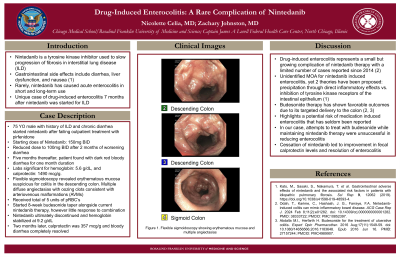Monday Poster Session
Category: Colon
P2588 - Drug-Induced Enterocolitis: A Rare Complication of Nintedanib


Nicolette Celia, MD
Chicago Medical School at Rosalind Franklin University of Medicine and Science
North Chicago, IL
Presenting Author(s)
1Chicago Medical School at Rosalind Franklin University of Medicine and Science, North Chicago, IL; 2Captain James A. Lovell Federal Health Care Center, North Chicago, IL
Introduction:
Nintedanib, a tyrosine kinase inhibitor, is a relatively new pharmacotherapy used to slow the progression of fibrosis in patients with interstitial lung disease. Gastrointestinal side effects consisting of diarrhea, liver dysfunction, and nausea are becoming more recognized (1). On rare occurrences, nintedanib has been shown to cause acute enterocolitis in both short-term and long-term use. Herein, we report a case of drug-induced enterocolitis seven months after nintedanib was started for progressing idiopathic pulmonary fibrosis (IPF).
Case Description/Methods: A 75-year-old male with history of IPF and chronic diarrhea was started on nintedanib after failing outpatient treatment with pirfenidone. Nintedanib was started at 150mg twice daily. After complaints of worsening diarrhea for two months, the dose was reduced to 100mg twice daily. Five months thereafter, the patient was found to have dark red bloody diarrhea present for one month. Labs were significant for: hemoglobin: 5.6 g/dL, and calprotectin: 1490 mcg/g. The patient underwent a flexible sigmoidoscopy which revealed erythematous mucosa suspicious for colitis in the descending colon. Multiple diffuse angiectasias with oozing clots consistent with arteriovenous malformations (AVMs) were also present. The patient received 5 units of pRBC’s in total. An 8-week budesonide taper was started alongside nintedanib therapy, however the patient had little response to this combination. Nintedanib was ultimately discontinued and the patient’s hemoglobin stabilized at 9.2 g/dL. Two months later, calprotectin was 357 mcg/g and his bloody diarrhea had completely resolved.
Discussion:
Drug-induced enterocolitis represents a small but growing complication of nintedanib therapy as only a limited number of cases have been reported since 2014 (2). Though the mechanism for nintedanib induced enterocolitis remains unidentified, two theories have been proposed: precipitation of enterocolitis through direct inflammatory effects vs. inhibition of tyrosine kinase receptors of the intestinal epithelium (1). Budesonide therapy has shown favorable outcomes in cases of nintedanib induced enterocolitis due to its targeted delivery to the colon (2, 3). We aim to highlight a potential risk of medication induced enterocolitis that has seldom been reported. In our case, attempts to treat with budesonide while maintaining nintedanib therapy were unsuccessful in reducing enterocolitis, ultimately leading to cessation of the drug.
Disclosures:
Nicolette Celia, MD1, Zachary Johnston, MD2. P2588 - Drug-Induced Enterocolitis: A Rare Complication of Nintedanib, ACG 2025 Annual Scientific Meeting Abstracts. Phoenix, AZ: American College of Gastroenterology.

